When it comes to website analytics, Google Analytics is the king. This is true even though many websites use multiple analytics platforms.
Is Google Analytics’ dominance in the analytics market the same as its crushing dominance in the search engine market, with only weirdos using other search engines?
No. Many people use a Google Analytics alternative because they want more features, or have concerns over data privacy.
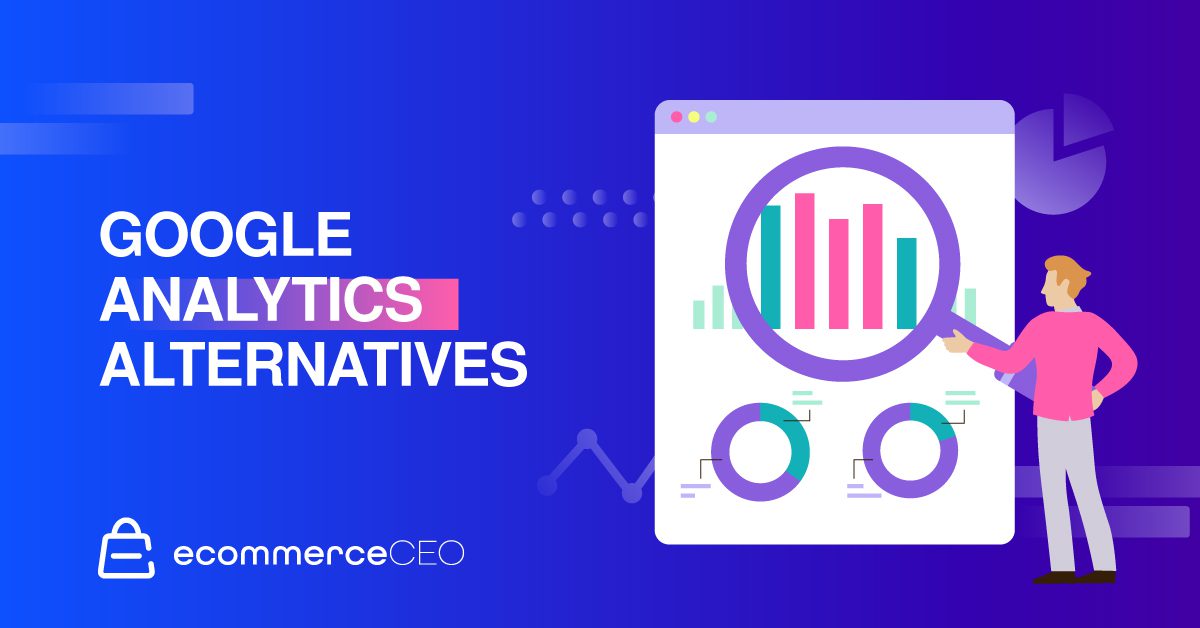
A recent ruling of an Austrian Data Protection Authority puts more pressure on marketers to look for a Google alternative.
With features, some want to understand consumer engagement, and others care about visit statistics. Some record heat maps to get insights into improving the web page’s user interface (UI). Others are only interested in display ads’ performance.
No one solution covers all the use cases, and various Google Analytics alternatives bring distinct advantages to the table.
Aside from that, there are several reasons not to use Google Analytics, even though it’s free. (This is a huge red flag for any product or service, but more on that later.)
Let’s look at the problems and controversies with Google’s web analytics, then explore alternatives for ecommerce marketers.
Why Ecommerce Marketers Should Use Analytics in the First Place
Correctly implemented web or in-app analytics give you a huge opportunity to learn from real-life examples. Don’t miss out on this insight by simply believing in vaguely defined gut instincts. This is just one of many mistakes an ecommerce marketer can make.
Only data matters.
But to collect it, cross-reference, and analyze it, you need a proper analytics solution.
There are three areas where an analytics tool can help you improve your business.
Web Pages
Use advanced web analytics to improve the design of your store page. Test various solutions, spot, and eliminate problems that may deter people from completing the purchase.
Audience
Don’t underestimate the value of data on people visiting your website. Tailor your shop experience towards more profitable segments of your audience and try to address problems that potential audiences face. Test new sources of traffic, such as domain redirect.
Product
You can get hints on what people think about your product or how they use it by tracking the return rate, support tickets, or—if your product is an app or has an accompanying app—using in-app analytics.
Google Analytics History
Google Analytics goes way back to times when page visit statistics were everything. The history of GA started with acquiring Urchin, a web analytics software that became the foundation of the future web analytics leader.
Urchin was developed when no one had even dreamt about mobile browsing or cross-device tracking. Everyone was only interested in raw numbers: how many visits on my website, how many clicks on the call to action (CTA).
The Needs of a Contemporary Ecommerce Marketer
Today’s reality requires a lot more sophistication. Simple visit counting with views per month won’t cut it. To build the optimal user experience, marketers need additional features like:
- Real-time analytics
- Abandoned cart tracking
- In-app tracking
- Customer journey
- Offline and online sales tracking
- Mobile apps tracking
- Tracking the entire user journey
- Consumer lifetime value
- Cross-device tracking
- Personal data protection and compliance with GDPR, Russian data protection laws, Chinese protection laws, and more
- User behavior tracking
- Predictive analytics
- Actionable insights
Sprinkle that with custom event tracking capabilities for added personalization, and you get the idea of what you should look for in Google Analytics alternatives.
The Perfect Analytics Software
Marketers don’t just want to know if they are profitable. They want to know why they are profitable (or not) and how to increase profitability, attract customers, and learn from them.
Google has been updating its product with many features but couldn’t change its core design built around website analytics.
Getting this data is simple.
Getting anything else from Google analytics is a hassle – at best.
A good analytics tool allows you to:
- get data from multiple channels,
- discover conversion funnels, so paths that customers take that result in a conversion,
- identify user behavior,
- provide detailed data, not sampled,
- and achieve all that with no strict data limits.
What are the problems with Google Analytics?
The point here is not to make Google Analytics look bad but to present its limitations.
Session Cookie Tracking
GA uses session cookies to track user engagement. These cookies die out after the session ends: a web browser is closed.
This does not fit the modern world and user habits. Users often switch devices: they start reading on a laptop, continue reading on a mobile device while on their way to work, and finish on their computer.
That’s typical customer behavior.
Also, users don’t necessarily make a purchase or engage otherwise with a web page the very first time they’ve seen your ad.
It may take some time to create brand awareness in a user’s mind. The users themselves may also need time to check reviews of your product, read opinions, think a bit about it, and go back to your product later.
Humans are not algorithms that make instant decisions on the go: they may be tired, in a hurry, in a bad mood, or on the wrong device.
Google Analytics can’t track this erratic behavior.
Privacy Concerns
There’s a problem with all supposedly free platforms, and the general wisdom is:
“If you’re not paying for the product, you are the product.”
If you’re concerned about data ownership, Google Analytics may be problematic. After all, this company gets most of its profits from selling ads through Google Ads.
You want to learn what works on your site, but they want to know it as well.
Who knows what data mining they perform to feed Google Ads’ algorithms.
The problem is even more significant when handling sensitive customer data, like medical records. There is separate legislation on handling sensitive data in many countries.
Also, Google Analytics is not compliant with GDPR requirements, at least not without a correct setup. This legislation offers the highest level of protection for companies within its jurisdiction. The Austrian DPA ruling states that Google Analytics will never be GDPR compliant – it still passes sensitive data to servers based in the US. Data that can be accessed and even de-anonymized by authorities.
As you will learn from our ranking below, you can find a privacy-friendly alternative worth adding to your analytics tool belt.
User-friendliness
If Google Analytics were a building, it would be a pyramid—built upside down. In an attempt to catch up with the changing world, Google has been adding new features for the past ten years. The result is, well, a powerful yet complex product.
There’s a reason for so many Google Analytics courses being available online. This is a testimony of not only Google Analytics’ popularity but also of its complexity.
The learning curve is steep and time-consuming. Not everyone wants to dedicate a portion of their lives to learning analytics. Some people only want a simple solution that will tell them straight away what works and what does not.
This does not necessarily mean that alternatives to Google Analytics have to be limited in functionality. It’s good to look for a feature-rich platform that offers custom reports and simple analytics at the same time.
Data Sampling
Google Analytics doesn’t always give you access to the raw data it collects. Sometimes, the presented numbers are merely sampled. That means that Google takes a sample of your data, analyses it, and extrapolates the results.
This brings results that, however accurate they may be, are still just estimations because they are not based on exact data.
Google Analytics alternatives provide access to raw data. That’s one of their major selling points.
Aggregated Data
Google Analytics likes big numbers. It believes in statistical and big-scale analysis rather than zooming in to the level of a single user.
Depending on your scale, you may be more interested in analyzing single-user journeys rather than aggregated data—primarily if you sell a lower quantity of items with high margins.
Google Analytics Alternatives for Ecommerce Marketers
Let’s go over some of the best Google Analytics alternatives, fit for one-person operations and mid-size businesses.
Matomo
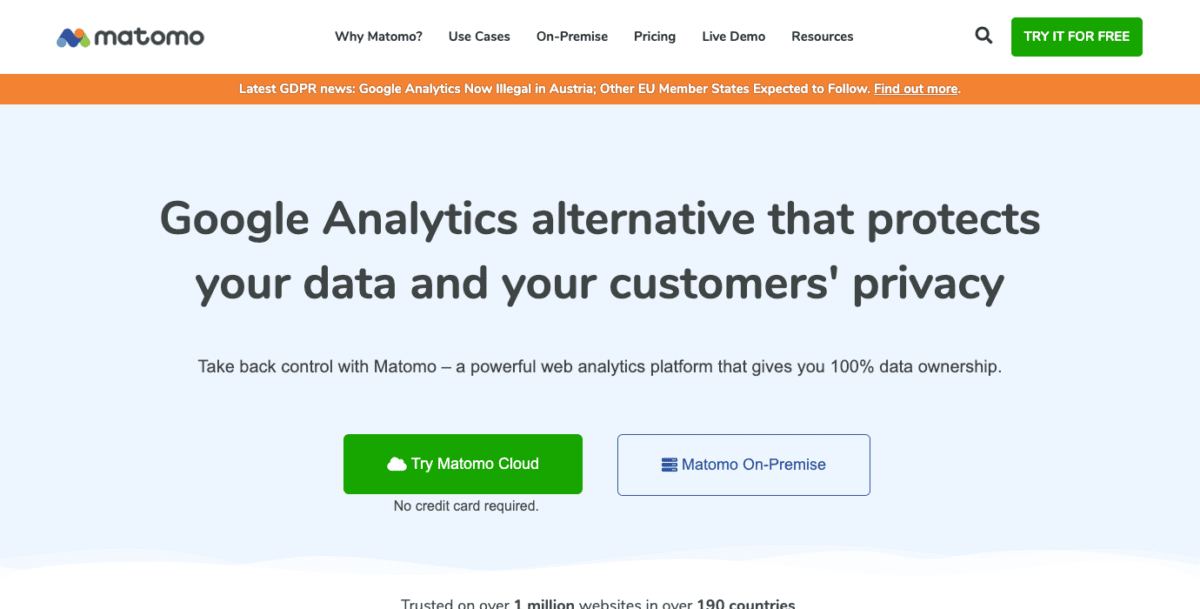
Matomo (a Japanese word that means “honesty”) is an open-source Google Analytics alternative. It shines in areas where GA lacks: data ownership, self-hosted installations (there is a cloud option, too), GDPR compliance, and no data sampling.
Matomo (formerly known as ‘Piwik’) is free for those users that opt for the “on premise” (self-hosted) version. This gives users complete control over the tracked data. It also adds additional costs of renting or setting up a server.
For convenience, users can get a cloud version of Matomo. The price depends on the number of monthly visitors.
Ecommerce marketers can use Matomo’s features dedicated to their use case. Once this feature is enabled, it allows users to track order values, shipping costs, abandoned carts, and more.
- Open source: Yes
- GDPR compliant: Yes
- Free plan: Yes, for the self-hosted version
- Ecommerce oriented features: Yes
Piwik Pro Analytics Suite
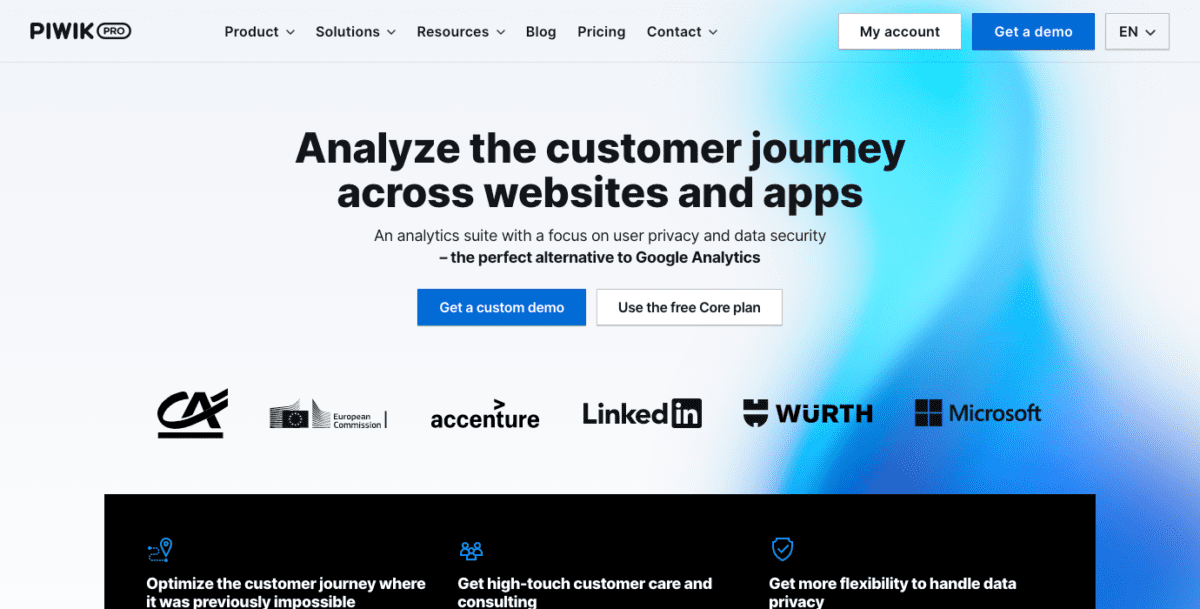
Piwik Pro Analytics Suite branched out of Piwik, an open-source platform known as Matomo. It offers a robust analytical solution with comprehensive insights and a low barrier of entry.
Piwik Pro consists of several modules dedicated to analysis, tag management, and consent collection. It also enables SharePoint analytics, something that Google Analytics lacks.
This is one of many Google Analytics alternatives that emphasizes data privacy for both its users and tracked customers. It offers compliance with GDPR and other privacy-oriented legislation and the option to track data of consenting users only for privacy-friendly analytics.
Piwik Pro has options dedicated to ecommerce tracking. However, their implementation is slightly more complicated, as it involves copying JavaScript written functions into a tracking script.
- Open source: No
- GDPR compliant: Yes
- Free plan: Yes, for cloud-hosted core plan
- Ecommerce oriented features: Yes
StatCounter
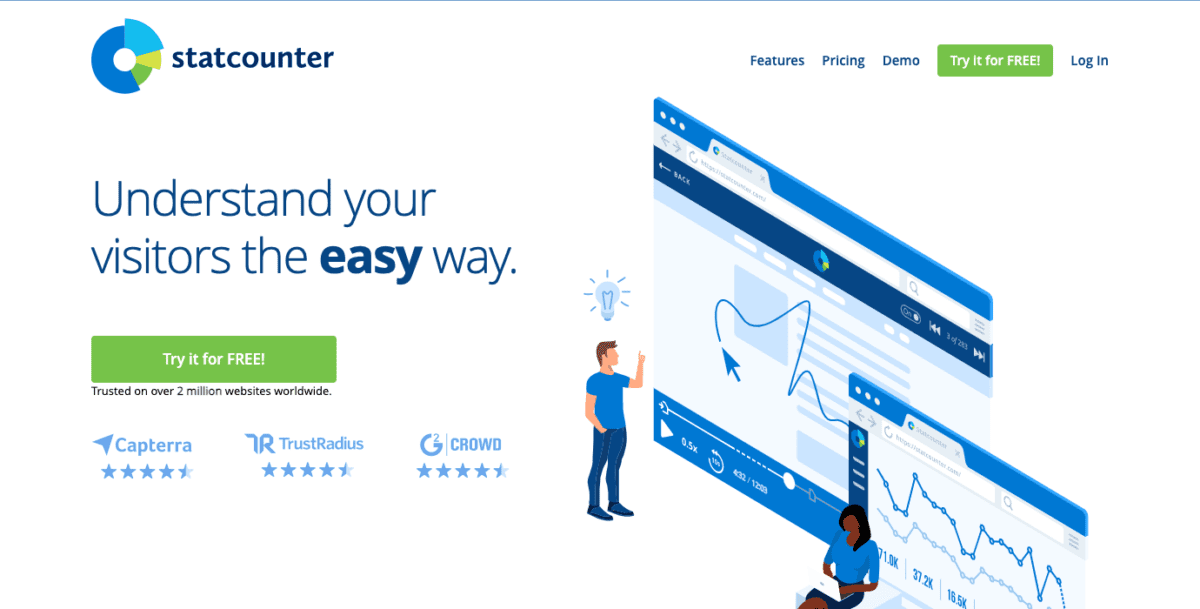
StatCounter is the oldest contender on our list. Dating back to 1999, it’s a living piece of internet history.
Don’t be fooled into thinking that its tech is old and obsolete. StatCounter allows you to track web traffic and analyze audiences. It also detects bot traffic and, by syncing with Google, can show you what keywords your visitors used to find your page.
The strong emphasis on audience analysis is one of the key features of StatCounter. It does not, however, have dedicated features for ecommerce marketing.
StatCounter offers a free, ad-supported plan (ads display on their site, not yours!)
- Open source: No
- GDPR compliant: No (but can be set in a way that is GDPR-compliant)
- Free plan: Yes, for 500 page visits per month and a free trial of paid plans
- Ecommerce oriented features: Yes
Woopra
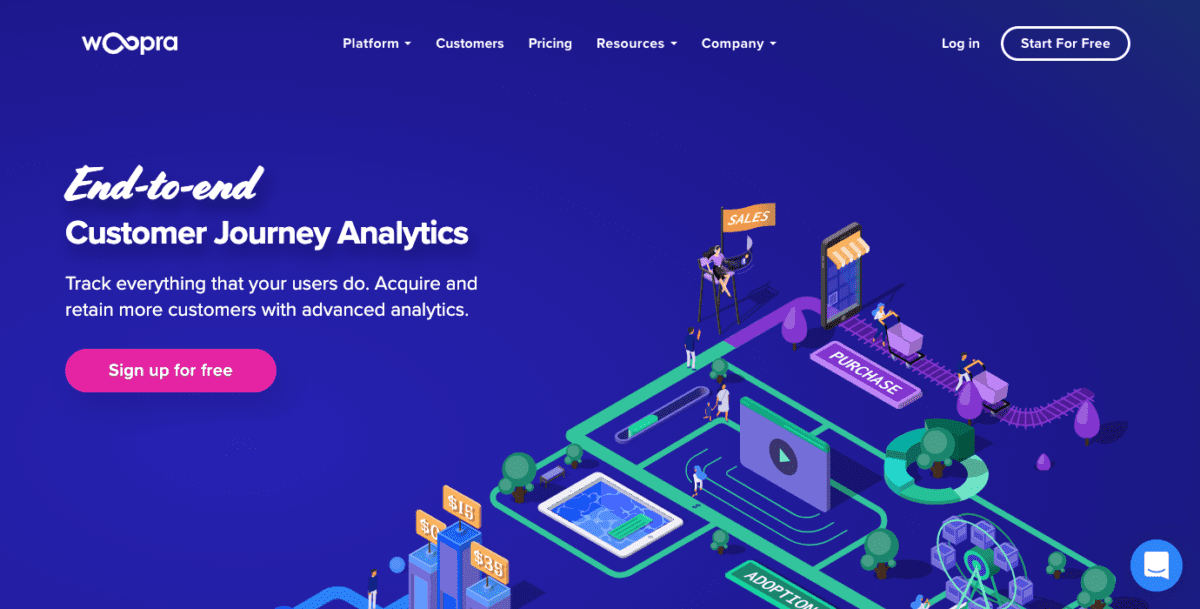
Woopra is a platform that wants to break the rules of the analytical game. Its goal is to ditch ancient channel-specific analytics and focus user attention on customer experience.
Woopra builds an individual profile of each user and records every touchpoint, including support tickets, text messages, and so on. Integrating popular platforms and automation solutions adds even more to the already high value.
For marketers focused on tracking the lifetime value of a customer and bettering their product, Woopra would be an ideal choice. It has a free plan. However, if you want more than what’s offered in this plan, prepare to spend some serious cash, as the lowest paid plan is $350.
- Open source: No
- GDPR compliant: Yes
- Free plan: Yes, for 500k actions per month and a free trial of paid plans
- Ecommerce oriented features: Yes
Voluum
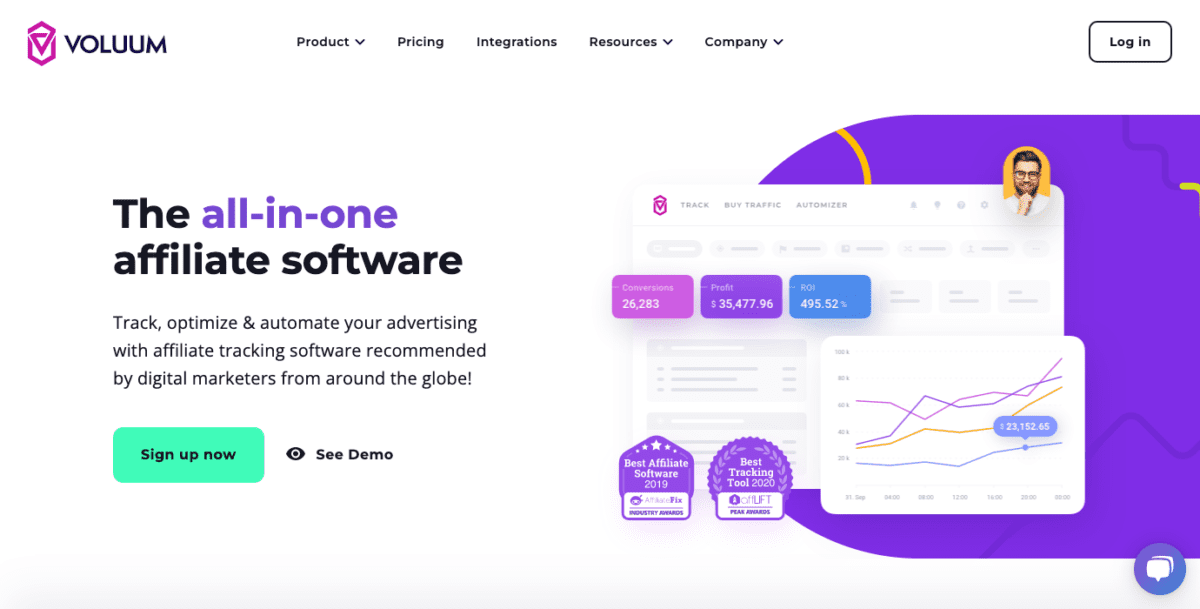
Most analytical solutions and Google Analytics alternatives offer precisely what they promise: a platform that records website data and presents them as reports.
Voluum is an ad tracking platform that brings more to the table. It is perfect for marketers that like to adjust their marketing strategies on the fly and A/B test different ideas.
Voluum can rotate offers or use AI to drive more traffic to the most profitable offer or landing page. It supports redirect tracking, which does not require editing landing or offer pages.
This platform hits all the marks a proper Google Analytics alternative should have, plus some. It can drive customers with unique characteristics (for example, different device types) to separate campaign funnels to ensure an optimal experience.
Voluum handles big numbers by recording them with ease and using its vast reporting engine to present them meaningfully.
- Open source: No
- GDPR compliant: Yes
- Free plan: No, but a free demo is available
- Ecommerce oriented features: No
Heap
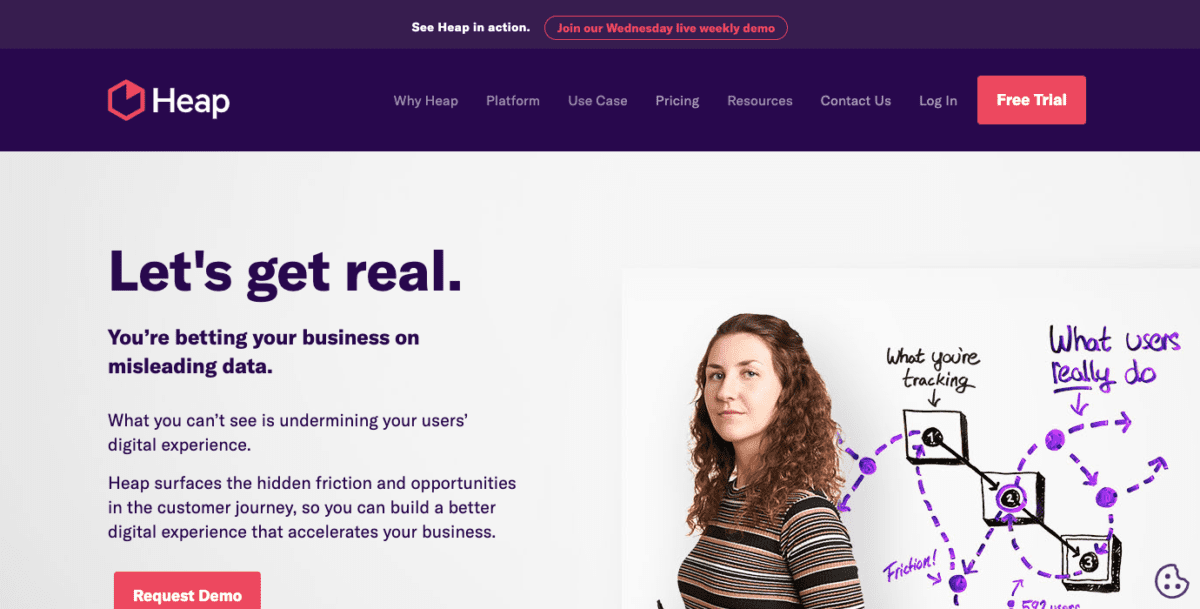
Heap is trying to set itself apart from other analytical solutions that it does not even call itself one. Instead, Heap uses the term ‘digital insight platform,’ but what they offer lies within what other analytical solutions provide.
It has a set of features dedicated to ecommerce marketers that allow them to recreate customer journeys by tracking every interaction with your sites.
Heap claims it is user-friendly and intuitive; this product is more suited for teams in big companies rather than for small marketers trying to sell their handmade jewelry. Heap offers a free plan and a free trial of paid plans if you are interested.
- Open source: No
- GDPR compliant: Yes
- Free plan: Yes, and free trial
- Ecommerce oriented features: Yes
Kissmetrics
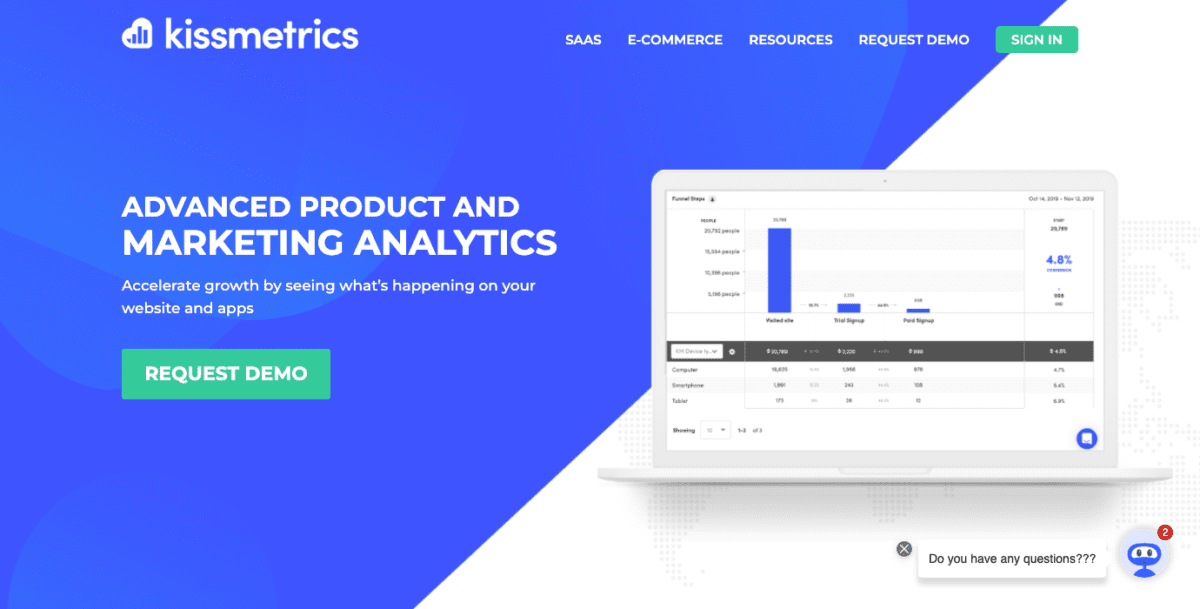
Kissmetrics is a platform built for medium-size ecommerce stores. It has all the features you want, like audience analysis and detailed customer reports.
Unlike Google Analytics, Kissmetrics is not focused on sampled page view data. It measures each customer touchpoint to get a complete picture of the customer journey.
The short version is that they help turn prospective customers into advocates.
Kissmetrics may be hard to set up if you lack the expertise or don’t have a helpful IT department at hand. However, it will bring the results you expect from it once set.
Kissmetrics doesn’t have a free plan, but prospective customers can request a platform demo.
- Open source: No
- GDPR compliant: Yes
- Free plan: No
- Ecommerce oriented features: Yes
Adobe Analytics
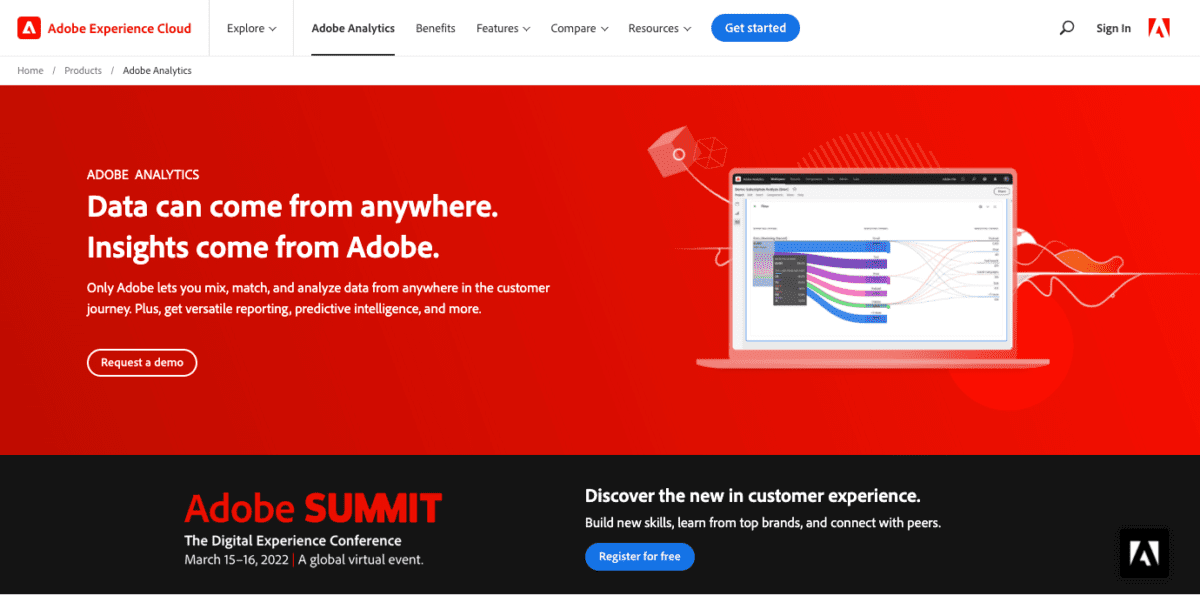
Adobe Analytics is a tool from a well-known company that makes software for creators. As you may expect, the analytics platform is packed with features.
First, it is a web analytics tool. Web analytics is still the core of user behavior. But Adobe Analytics is far from being just that, which brings us to the second point.
Second, this analytics platform can connect any additional marketing channel you can imagine. Social, IoT, video, mobile apps, you name it. Get sales data from wherever they appear.
Third, it can attribute all your data from these channels to conversion events.
Fourthly, and most impressively, it can employ predictive analytics to give you insights into the future. While most analytics tools allow you to learn from the past, only Adobe Analytics tries to show you the future.
Unfortunately, official pricing is not available. You can only get in touch with a sales rep to get a quote.
- Open source: No
- GDPR compliant: Yes
- Free plan: No
- Ecommerce oriented features: Yes
Oribi

Oribi exists on the other end of the spectrum from Google Analytics or Adobe Analytics. It is a tool that everyone should use, not just developers or professional analysts.
Don’t get fooled by thinking it is a simple platform for small-time marketers. Businesses like Audi and Sony use Oribi.
Oribi works out of the box without requiring a complex setup. Its simplicity does not limit its functionalities: it delivers actionable insights and provides a detailed view of individual customer journeys.
Oribi ticks all the boxes of good analytics software. It shows you trends, connects multiple channels, tracks various events, attributes conversions to the correct sources, and presents them in customizable reports.
Oribi offers a free trial option, and its paid plans depend on the usage parameters.
- Open source: No
- GDPR compliant: Yes
- Free plan: No, but a free trial is available
- Ecommerce oriented features: Yes
One Analytical Solution is Not Enough
While trying to be comprehensive, these tools usually do one thing great, but others, not so much. The overall notion is that you should use more than one solution to have an accurate bird’s-eye view.
Use one solution for page metrics and another for customer engagement, one to measure page views, and another to record conversions using postbacks.
Compile your own set of analytics software that will fit your use case, specific to your business goals. Track as you like and use the detailed insights to make better business decisions.









